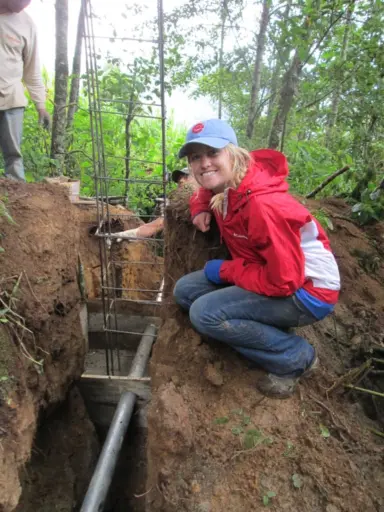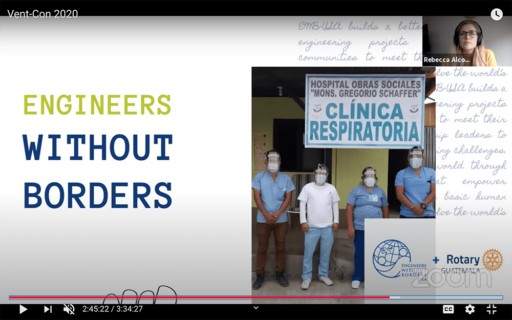While her University of Wisconsin-Madison engineering classmates were landing jobs or applying to graduate school, Rebecca Alcock was preparing for a summer of volunteer work in a Guatemalan mountain town and trying to sort through her uncertainty about the future.
During those three months at the Engineers Without Borders office in Joyabaj in Guatemala’s Western Highlands in the summer of 2018—amid working on infrastructure projects and interacting with the local community and government—Alcock found the career inspiration she had been missing.
 Alcock on an Engineers Without Borders trip to Guatemala.
Alcock on an Engineers Without Borders trip to Guatemala.
“I decided to pursue grad school and dedicate the rest of my studies and career to global health and development work,” she says.
Alcock is now doing just that as a recent master’s degree recipient in biomedical engineering and an incoming PhD student in industrial and systems engineering at UW-Madison. And, two years later, her experience in Guatemala has allowed her to play a leading role in a large-scale, United Nations-backed effort to mobilize production of personal protective equipment (PPE) and more in developing countries around the world amid the COVID-19 pandemic.
The project is a collaboration among engineers and other experts at UW-Madison, Marquette University, the University of Colorado Anschutz Medical Campus, Colorado Mesa University, Engineers Without Borders (EWB) and the United Nations Development Programme (UNDP).
With support from the UW-Madison International Projects Office, Alcock is leading a small team that’s consulting with government officials, healthcare systems leaders and local manufacturers in Guatemala, Yemen, Malawi, the Maldives and Sudan on design and production of PPE like face shields and masks, medical equipment such as ventilators, and water, sanitation and hygiene infrastructure. The group has also offered ad hoc technical assistance to groups in Ethiopia, Lebanon, Malaysia, Mexico, Mozambique, Nigeria, the Philippines, Turkey, Vietnam and Zimbabwe.
It all started in Guatemala through seeds planted in the aftermath of the Fuego volcano eruption during Alcock’s summer there, when Engineers Without Borders worked with local Rotary clubs to aid the government’s disaster response.
“The silver lining of that whole disaster and devastation is there were all of these really strong partnerships formed for disaster response work in Guatemala,” says Alcock.
When EWB senior engineer Michael Paddock contacted the UW Makerspace team to inquire about replicating its approach for production of the Badger Shield in Guatemala, Alcock, a graduate assistant at the makerspace, was a natural fit to get involved. She’s drawn on both her medical device design-intensive background as a two-time biomedical engineering graduate and her work on Shield Net, the online face-shield matching platform that grew out of the Badger Shield collaboration.
 Through her work on the PPE project, Alcock has participated in video calls with partners around the world.
Through her work on the PPE project, Alcock has participated in video calls with partners around the world.
As part of a small team that also includes recent Marquette engineering graduate Jessica Thayer, Alcock has developed a “playbook” for implementing local PPE production—including assessing needs, designing equipment, sourcing materials, retooling production lines, and matching manufacturers and healthcare providers—based on early success in Guatemala. The collaborative effort in the Central American country resulted in the distribution of 75,000 units of PPE within four weeks, a rapid turnaround that caught the UNDP’s attention.
“We were working on a timescale that was three times faster than what some of the other aid organizations had envisioned for setting up local production,” says Alcock, who credits collaborator Dr. Edwin Asturias, a professor of pediatrics and infectious diseases at the University of Colorado, native of Guatemala and head of the country’s Presidential Commission Against Coronavirus, for facilitating key connections.
Local production of equipment is key, Alcock says, because the pandemic continues to strain and disrupt global supply chains. That approach, though, is a shift in countries that are accustomed to importing supplies or relying on humanitarian aid in times of crisis. Alcock’s team has also helped decision-makers weigh the most effective means of spending to protect healthcare workers, reduce patient deaths and bolster local manufacturers.
“There isn’t money to make a mistake,” she says.
Alcock’s work on the project landed her a spot on a virtual panel on tech-enabled health innovations for COVID response in low-income markets during a breakout session of the 2020 UN Global Compact Leaders Summit in June.
In fall 2020, she’ll start work on her PhD as part of Assistant Professor Justin Boutilier’s lab. Through a UW-Madison Global Health Institute Planetary Health Scholarship, Alcock plans to design a novel energy and transportation system for rural healthcare clinics in sub-Saharan Africa using renewable microgrids and electric vehicles.
For now, though, she’ll stay busy helping countries around the world respond to the pandemic.
“The fact that it’s grown to this scale is just beyond belief,” she says. “I can’t believe that I spend my days on calls with a division of the United Nations. It’s all been so surreal.”